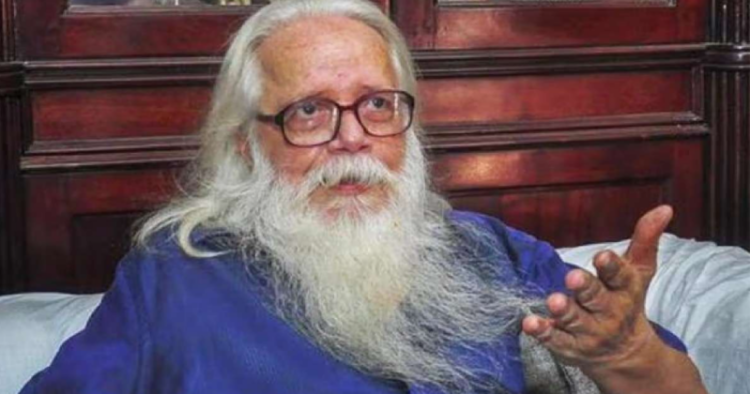New Delhi: The Central Bureau of Investigation (CBI) has officially cleared Dr. Nambi Narayanan, a senior scientist from the Indian Space Research Organisation (ISRO), of any wrongdoing in the infamous 1994 espionage case. According to the CBI chargesheet, Kerala Police officers, under the direction of senior officials, wrongfully implicated Dr. Narayanan without sufficient evidence.
Dr. Nambi Narayanan’s wrongful arrest occurred on July 10, 1994, orchestrated by former Kerala Director General of Police (DGP) R.B. Sreekumar, on the instructions of then Thiruvananthapuram City Police Commissioner R. Rajeev. The chargesheet highlights that there was no proof to substantiate the espionage accusations against Dr. Narayanan, as confirmed by the statement of former Intelligence Bureau Assistant Director Vinod Kumar.
The Supreme Court of India had previously recognized the injustice faced by Dr. Narayanan, ordering a compensation of Rs 50 lakhs for his “unjust imprisonment, malicious prosecution, and humiliation.” In a ruling on September 2018, the Supreme Court described the police actions against Dr. Narayanan as “psychopathological treatment” and a violation of his basic human rights, including liberty and dignity.
Read More: Uttar Pradesh: Allahabad High Court denies bail to Shoeb Akhtar in beheading case of Hindu woman
In June this year, the CBI filed a chargesheet against five individuals implicated in fabricating the case. The accused include former Kerala DGP Siby Mathews, former Gujarat DGP R.B. Sreekumar, former Intelligence Bureau officer P.S. Jayaparakash, former Police Deputy Superintendent K.K. Joshua, and retired Police Inspector S. Vijayan.
The case originated in October 1994 when Kerala Police registered two cases following the arrest of Maldivian national Mariam Rasheeda in Thiruvananthapuram. Rasheeda was accused of collecting secret ISRO rocket engine drawings to sell to Pakistan. Alongside her, Dr. Narayanan, Director of the Cryogenic Project at ISRO, Deputy Director D. Sasikumar, and Rasheeda’s associate Fousiya Hasan were also detained.
The CBI’s thorough investigation revealed that the allegations were baseless and fabricated. This led to the Supreme Court’s April 15, 2021, directive to transfer the high-level committee’s report on the culpable police officials involved in the 1994 case to the CBI for further action.
The false charges against Dr. Narayanan were purportedly designed to derail India’s advancements in cryogenic technology. However, opinions remain divided on this aspect, with some rejecting the notion of a deliberate conspiracy against India’s scientific progress.
Dr. Narayanan’s exoneration brings a measure of justice to a distinguished scientist whose career and life were significantly impacted by the unfounded accusations. The case stands as a cautionary tale against the misuse of power and the importance of safeguarding individual rights.



















Comments